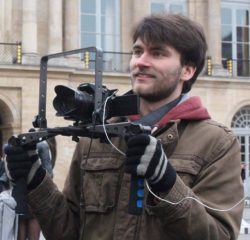A Film degree: A balancing act?
I’ve been involved in filmmaking since my first year at Warwick, doing my best to write, shoot, and edit short films while trying to keep on top of a Film and Literature degree.
I’d like to end up directing films after university (which is somehow less than a month away?!) and although Warwick is one of the best in the country for Film Studies, the course is entirely theoretical. For a creative career in the industry, on-set experience is just as important as knowing the history of silent cinema and ‘what is art?’ (I’m even less sure on the answer than I was three years ago), so I aimed to be involved in film shoots as much as possible when I came to here.
I studied screenwriting as a module which has had a direct impact on how I view writing and filmmaking, and I also had the opportunity to make a video essay for a criticism module
Around the beginning of my second year, a new society started up which aimed to replicate the professional production process, as well as teaching members the many aspects of filmmaking. After directing a couple of films through BFT Film Productions, I joined the exec as Project Manager for my third year.
The role involves managing creative short films as a kind of executive producer, while the Services Manager handles the promotional side of the society. The first challenge I organised wasn’t exactly small; our Writer’s Rep had the idea of ‘BFten’, in which members would submit a two-page script based on a specific theme, and the ten best would be made into individual films. I needed to arrange almost a hundred people into separate teams, taking into account the production roles they wanted and their available dates, then fit the shooting of ten films into about two weeks. With the help of a rather intimidating Excel document (a program which doesn’t crop up much in a humanities degree), we somehow managed to pull it off. It was certainly a stressful time, but the overwhelming success of the challenge made it worthwhile, with many members who’d never picked up a camera before creating some great short films.
Nothing’s been as intense to organise since then, and managing my time between the exec, a degree and some kind of social life hasn’t been too difficult. Although it’s easy enough to catch up with the films for my course, less so reading a couple of novels a week for the English half; something I wasn’t necessarily always on top of, but show me a literature student who is!
For a creative career in the industry, on-set experience is just as important as knowing the history of silent cinema and ‘what is art?’
Although the course itself lacks hands-on experience, everything taught can be applied in some way to filmmaking – it’s all the same medium in the end, and it’s valuable to have a broad understanding. I studied screenwriting as a module which has had a direct impact on how I view writing and filmmaking, and I also had the opportunity to make a video essay for a criticism module, choosing to analyse the TV series Utopia; it received one of my highest grade by far, which was encouraging and which has allowed me to experiment with a new mode of editing.
I’ve still managed to be involved in plenty of films during my time on BFT, ranging from a 15 second horror (with 50,000 views and seen by Eli Roth!) to an ambitious thirty-minute post-apocalyptic film which I’m currently editing. I’m proud to have been a part of one of the fastest-growing societies on campus, and hopefully the skills and knowledge I’ve learnt from my degree and BFT will help me find a career in a notoriously difficult industry. Although preferably one which doesn’t involve Excel.


Comments